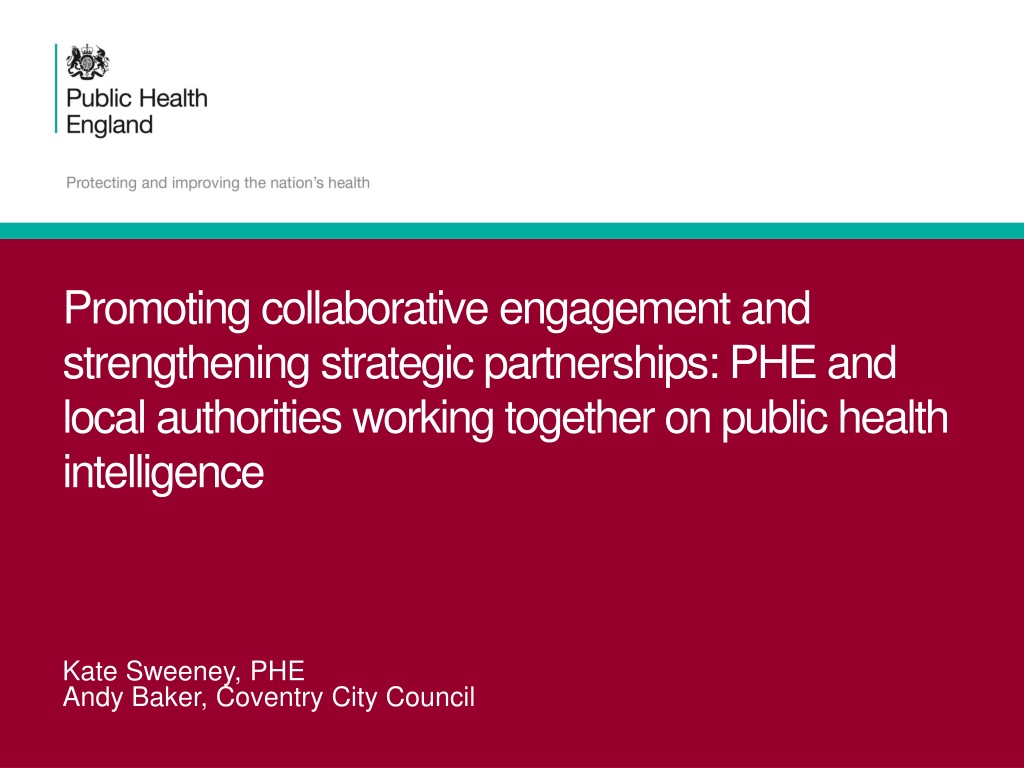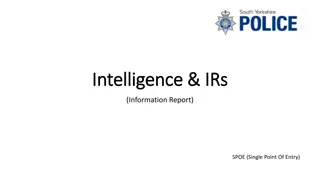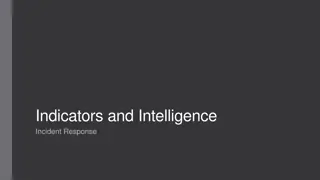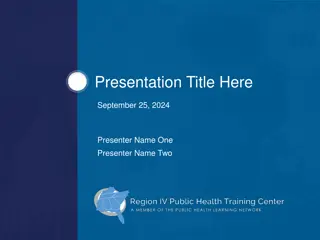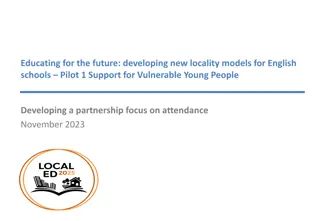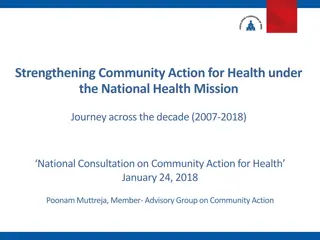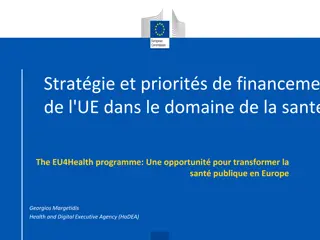Strengthening Strategic Partnerships for Public Health Intelligence
Promoting collaborative engagement between Public Health England (PHE) and local authorities is crucial for enhancing public health intelligence. PHE, as an arms-length body of the Department of Health, focuses on population health, prevention, and reducing health inequalities. Through initiatives like the Local Knowledge and Intelligence Service (LKIS), PHE supports local authorities in analyzing key public health priorities, providing expert analysis, and transferring knowledge for effective use of national resources at the local level.
Download Presentation

Please find below an Image/Link to download the presentation.
The content on the website is provided AS IS for your information and personal use only. It may not be sold, licensed, or shared on other websites without obtaining consent from the author. Download presentation by click this link. If you encounter any issues during the download, it is possible that the publisher has removed the file from their server.
E N D
Presentation Transcript
Promoting collaborative engagement and strengthening strategic partnerships: PHE and local authorities working together on public health intelligence Kate Sweeney, PHE Andy Baker, Coventry City Council
Who are PHE? Arms-length body of DH, formed on 1 April 2013 Brought together 70 organisations including the 8 former Public Health Observatories Focus on population health and prevention/risk factors/inequalities Approx 5500 staff based all over the country (220 working in knowledge & intelligence) Our stated mission We protect and improve the nation's health and wellbeing, and reduce health inequalities Our responsibility to Local authority partners To share our information and expertise to help LAs make improvements in the public s health To help local authorities to develop the public health system and its specialist workforce 2
Local analysis Providing expert analysis for the local public health system, to help understand and address key public health priorities Ad-hoc analysis and requests service Providing analysis and benchmarking to inform business planning and local prioritisation of public health action Local support for users of key technical tools and products including GIS and Return on Investment tools Developing proof of concept pilots and other local projects to test new and innovative approaches including use of new data sources. 4
Local knowledge transfer Active dissemination of national PHE K&I resources, supporting their local use and gathering feedback on their value Providing key local messages and summary analyses from national products Supporting delivery of webinars, workshops or other activities to disseminate national products and tools Providing regular communications containing information about news, events, publications and data releases from PHE and other national bodies Facilitating closer working between local users and national teams involved in the development and maintenance of PHE intelligence products 5
Local training and professional workforce development - developing capacity and capability of the wider public health workforce, with a specific focus on health intelligence Facilitating, supporting and managing regional Health Intelligence Networks Delivering a range of specialist public health intelligence courses Delivering training sessions on public health intelligence for non-specialist staff in local authorities, partner organisations and throughout PHE Facilitating and/or supporting commissioning of external training for local authority staff e.g. SQL training, based on locally identified priorities 6
Local Knowledge & Intelligence Service (LKIS) West Midlands - Plan on a Page 2016/17 To support and advocate for effective local public health action in the West Midlands through the delivery of high quality tools & products, analysis, expert advice and training Strategic Vision Local Analysis - Providing expert analysis for the local public health system, to help understand and address key public health priorities Local Knowledge Transfer- Active dissemination of national PHE K&I resources, supporting their local use and gathering feedback on their value Local Training & Workforce Development - Developing capacity and capability within the wider public health workforce, with a specific focus on health intelligence We will deliver this via: Core Principles Integrated working with local PHE Centre Do once for all and share Cross-functional K&I working Operate as part of a distributed national service working locally to deliver a consistent, responsive and high quality local knowledge and intelligence service as part of PHE Centres; Actively disseminate national PHE K&I resources for local use, whilst gathering feedback on their value; Develop approaches for working with devolved areas and combined authorities; High Level Objectives Develop a menu of public health intelligence support for Combined Authorities, including bespoke analysis for the WM Combined Authority and Mental Health Commission. PHE Centre Data Surveillance & Peer Benchmarking to inform Centre planning and local prioritisation of public health action, as part of ongoing Centre and regional assurance processes. Provide local input into WM STPs via signposting/advisory support to relevant PHE tools and data sources to inform local health & wellbeing gap analysis Application of the Hub Diagnostic approach to stakeholder engagement with other LAs across WM Key Local Projects Provision of a high quality, locally responsive PHE expert knowledge and intelligence service to stakeholders Delivery of a range of external training and workforce development activities including: modular training on PH intelligence; specialist training (e.g. data visualisation/infographics, HES etc.); placement/secondment opportunities. Co-ordinate, support, plan & deliver regular local network events & workshops, e.g. WMPHIG Coordinate and lead LKIS representation at key national conferences and events and develop a high quality set of supporting materials Develop & implement a national programme of LKIS Webinars Key Activities High-quality delivery of the 16/17 work programme to the satisfaction of the Stakeholder Advisory Group Positive stakeholder engagement and feedback from Local Authority Public Health Intelligence teams Routinely inform PHE Centre planning and local prioritisation of public health action, as part of ongoing Centre surveillance and regional assurance processes, to the satisfaction of the PHE Centre Director. Impact Measures 1 x Associate Director (1.0 WTE) 1 x Principal Analyst (0.8 WTE) 1 x Senior Analyst (0.5 WTE) 2 x Knowledge Transfer Facilitator (1.4 WTE) 2 x Intelligence Analysts (0.5 WTE each) Total Whole Time Equivalent (WTE) = 4.7 Resources Email: LKISWestMidlands@phe.gov.uk
Intelligence, Engagement, Performance Local partnerships with universities and other bodies to improve knowledge of city Links with decision makers including elected members and members of strategic groups such as Health and Wellbeing Board www.coventry.gov.uk/infoandstats/ www.coventry.gov.uk/infoandstats/ www.coventry.gov.uk/infoandstats/
West Midlands Public Health Intelligence Group Strong network to build from post NHS transition but challenges of the unknown Changes in membership and dynamic over time to become more active Facilitation from Public Health England and developing role of Local Knowledge and Intelligence Service
Challenges and successes of embedding wider social issues into economic agenda Partnership work between local authorities, Public Health England local and national teams Research and Intelligence group designing for the future
Common themes Relationships across different professional bodies and establishing mutual benefit Complex and messy what are shared principles? Trust and timeliness in use and re-use of information Continual journey
